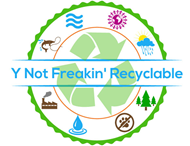[ad_1]
 In 2017, David Wallace-Wells, editor of New York Magazine wrote a long-form article depicting how the future will look to those living through it if we don’t make drastic changes to life as we know it.
In 2017, David Wallace-Wells, editor of New York Magazine wrote a long-form article depicting how the future will look to those living through it if we don’t make drastic changes to life as we know it.
The article quickly became the most-read article in the history of the magazine and sparked international conversation, leading Wallace-Wells to continue the conversation in his book: ‘The Uninhabitable Earth.’
The book breaks down the all-encompassing nature of climate change, from dying oceans and unbreathable air to economic crises and political instability and he identifies a tendency among all of us to be somewhat complacent about these facts.
Environment Journal got in touch with Mr Wallace-Wells to discuss his book in further detail.
At the beginning of your book, you write that you’re not an environmentalist and don’t even consider yourself a nature-person. Can you tell me about your journey and what led you to write the original essay?
The short answer is fear.
At the beginning of 2016, I started to see a lot of new research about climate change that to me, seemed alarming and urgent, but it wasn’t being reflected in this way in mainstream journalism.
I responded to this as a journalist looking for a story.
But when I looked at the research, I started to see not just a story, but a meta-narrative of the 21st century, it was hard to imagine any aspect of human life that wouldn’t be changed in some way by this force and I thought it was worth representing this revelation.
I wanted people to come to terms with the fact that this story will dominate all of our lives, no matter who we are, where we live and how protected we feel.
I was trying to generate in readers the awakening that I had myself, piece by piece.
A fact that really shocked me is that almost half the carbon exhaled into the atmosphere has been released in the last thirty years, you write that blaming climate change on the industrial revolution is an example of ‘historical villainy’ – why do you think this myth exists?
I think it’s mostly a reflection of our cultural narcissism, we like to think of climate change as this sin that was committed by people alive many generations ago.
This leads people to believe that it is therefore not their responsibility.
But when you understand the true history, you understand that this is very much the work of those of us alive today.
We’ve known for the last thirty years that climate change is a threat, and it’s a concerning sign that knowledge alone is insufficient to motivate us to really change.
The reality is quite the opposite, over the last thirty years we have produced more and more emissions every year.
In general, this is another feature of this story that makes it so dramatic, to think that the equilibrium of the entire planet has been re-engineered by human activity over the course of a single generation and we now have about that time again to re-engineer it once more in order to secure a relatively prosperous future.
It’s an incredible fact of being alive at this moment in history. You and I are going to be witnesses and participants in both parts of the story.
How important is behavioural change in tackling climate change?
I think in general, personal action is valuable.
It is useful to help people feel empowered, it’s a useful signal to people around you that you really care and it may even signal to politicians that you’re willing to make real changes in order to address these concerns.
But ultimately, the kind of changes we really need is so large that practically speaking, they can only be achieved through public policy.
If we need to rebuild the electric grid, that cannot be done through individual action.
Even a significant reduction in air travel by the guilty liberals of Western Europe is not going to get the world’s carbon footprint down to zero, and if 50 years from now we are still producing just 1% of the carbon emissions we produce today then we are still warming the planet.
As a generation, we have been taught to define our politics by what we buy and consume and not through actual politics.
It’s a really pernicious message of neo-liberals that the only politics that matters is the politics of consumerism and I think it’s one force that helps to explain why the world as a whole has been inert on climate change for so long because we’ve been taught that politicians can’t achieve anything on this scale.
You also write that you are wary of claims of climate action being used as an alibi for inaction, how do you think we can identify climate sincere politicians and companies when the issue is so complex and there are so many loopholes?
It’s a complicated question and at the moment we don’t have any single accrediting body to turn to.
Many pledges made by many corporations are examples of greenwashing.
BP is one example, they said they will reach net-zero by 2050, but that is just for the production of their fuels, not the consumption by users which is the majority of the emissions they are responsible for.
When it comes to government policy, it’s harder to judge, as national emissions are so much more complicated than emissions from a single company.
I’m heartened to see that the UK is considering banning the sale of non-electric vehicles by 2035, that’s really fast and it makes me think that we should take their net-zero commitments seriously, but I’m still sceptical.
For example, you look at Norway, they made the amazing pledge to reach net-zero by 2030, but they still have a national oil business who say they are planning to continue drilling for oil until 2075.
I don’t know exactly how you square those two simultaneous commitments.
You talk about the issue of plastic waste as a parable that has allowed us to partly ignore the climate crisis – can you expand on this?
It’s quite distressing to me that when you look at public opinion polls, a lot of people think that reducing their plastic consumption has a meaningful impact on their carbon footprint.
That is very wrong.
Of course, plastic has some carbon emissions, but ultimately it’s pretty trivial.
We have to question why people who are concerned with the environment are so concerned with plastic, and I think that’s because it violates our aesthetic senses of how the world should be.
When I come to this subject, I am a human chauvinist in that I am primarily concerned about the health and wellbeing of humans in this time of ecological collapse.
Of course, I am concerned with the degradation of ecosystems, but that is primarily because of how it impacts human life.
If I had to make a trade between significantly more plastic pollution in exchange for no carbon emissions, I would take that trade in an instant.
Aesthetically and morally it feels grotesque that we are degrading the planet in the way that we are, but I think it’s important to bare-in-mind the hierarchy of priorities and ultimately aesthetic violations are relatively trivial when compared to disturbances to the climate.
Although your book ends on a positive note in that you believe we are not too late to fix this problem, what would you say to someone who when reading your book feels a sense of despair over the extent and breadth of this issue?
From my own experience, the best antidote to despair is engagement, action and progress.
I would encourage people to use their anxiety to push themselves to take action, inevitably you will feel better.
But pulling back for a second, we are collectively sleepwalking towards disaster, and we’ve already allowed ourselves through complacency to warm the planet to hotter than its ever been in all of recorded history and we are headed for even more catastrophic levels of warming.
The question is, to me, either we are going to contemplate what’s possible and take action, or we are going to live with those consequences.
If it is distressing to consider the pathway that we are heading, which it should be, because it is, it’s going to be a whole lot more distressing to live through those scenarios.
We don’t have the luxury to look away, if we look away then we will live through a world that today we find anxiety-inducing.

The Uninhabitable Earth is available to order here.
Photo Credit – David Wallace-Wells and Pixabay
Source link
Y Not Freakin’ Recyclable Home
 Pollution Climate Change Holocene Deforestation Population Acidification Y Not Freakin' Recyclable
Pollution Climate Change Holocene Deforestation Population Acidification Y Not Freakin' Recyclable



